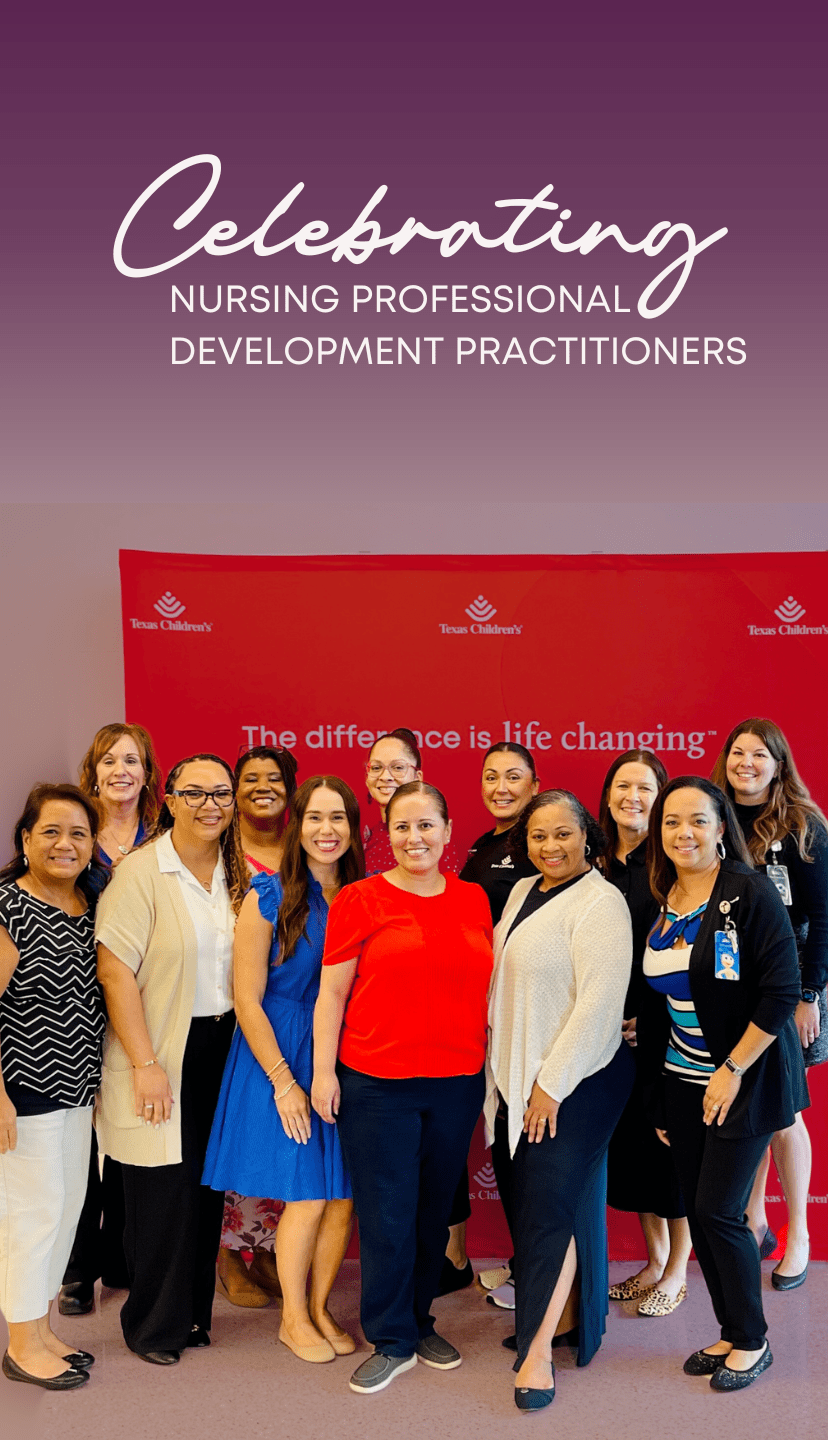Celebrating Nursing Professional Development Practitioners at Texas Children’s
Nursing Professional Development (NPD) Week, celebrated annually in September, is a special time to recognize the incredible contributions of our NPD Practitioners.
This year, Texas Children’s is marking the occasion with a team retreat that brings together NPD Practitioners—Nurse Educators and NPD Specialists—to focus on best practices, role clarity, teamwork and adult learning theory. The retreat will culminate in an awards ceremony to honor individuals who excel in advancing the professional growth of nurses.
What Makes NPD Practitioners Unique?
A Nursing Professional Development (NPD) Practitioner plays a crucial role in advancing the education and professional growth of nurses within a hospital setting. Encompassing roles like nurse educators, education coordinators, NPD specialists and clinical staff development specialists, they design, implement and assess educational programs that guide nurses from onboarding through ongoing career development.
Director of Nursing Excellence & Inquiry Lauren Kalember explains that NPD Practitioners help to address the “experience complexity gap” that emerges as experienced nurses retire and healthcare demands evolve. “NPD Practitioners are crucial to closing this gap,” Lauren says. “Their work ensures that nurses are well-equipped to meet the increasing acuity, complexity and technological advancements in patient care.”

A Day in the Life of an NPD Practitioner
The day-to-day responsibilities of NPD Practitioners at Texas Children’s vary depending on their focus within the hospital. Some work at the program level, overseeing initiatives like our required training, RN Residency Program, Central Onboarding and Continuing Nursing Education. These practitioners collaborate with stakeholders, track data and provide mentorship to ensure programs run smoothly.
Others are unit-based, working directly with nursing teams. These practitioners are hands-on, conducting competency validations, providing just-in-time education and facilitating practice changes. Whether at the unit level or system-wide, NPD Practitioners play a critical role in developing nursing professionals at every stage of their career.
“Having grown from a staff nurse role myself, it is rewarding being involved in multidisciplinary education and seeing our staff nurses grow from novice to tenured, experienced nurses,” says Delinda Castillo, an Education Coordinator in our Newborn Center.
Celebrating Excellence: The NPD Practitioner Awards
The NPD Practitioner Awards Ceremony was a key part of this year’s Texas Children’s NPD Week celebration, designed to honor individuals who exemplify excellence across various aspects of nursing professional development. These awards highlighted the diverse skills and contributions of NPD Practitioners, recognizing their efforts in areas such as mentorship, role development, innovative education and collaboration. The ceremony not only celebrated the achievements of these dedicated professionals but also emphasized the impact they have on advancing nursing practice, fostering professional growth and improving patient outcomes through creative, evidence-based approaches to education and training.

The Impact of NPD at Texas Children’s Hospital
At Texas Children’s, our NPD team is currently made up of 12 centralized practitioners, about 70 unit-based nurse educators and additional staff development specialists who support our community campuses. This dynamic team collaborates across the hospital system with clinical, Information Systems and Human Resources partners and others to provide ongoing education and support for our nursing staff.
This collaboration was evident in a recent initiative aimed at improving financial stewardship through orientation cost reduction. The NPD team worked together to prioritize time spent on education that was closest to the point of care, making learning more relevant and cost-effective.
“I was so impressed with the engagement, teamwork and collaboration among the nursing education teams. With a seat at the table, they had a chance to share their ideas and show the value of their specialty,” says Lauren.
Investing in Our Own Growth
The NPD Week 2024 retreat was not just about celebrating past successes; it was also about looking ahead to the future. Lauren emphasizes the importance of taking time to focus on professional development within the NPD team.
“As a leader in NPD, my role is to continue to develop the team that is developing people,” Lauren shares. “This retreat was an opportunity for us to model the learning activities we ask our teams to incorporate in their classes. It was also a chance to remind each other that we must invest in our own growth and development to best develop others.”
This retreat was a first-of-its-kind event at Texas Children’s, designed to create space for collaboration and growth among NPD Practitioners. The team spent time learning from one another, sharing best practices and setting priorities for the coming year.
“The team was energized to connect, engage in education relevant to their roles, and share their vision for transforming professional development at Texas Children’s,” Lauren says. “It was an honor to create a day that left them feeling excited and inspired about their work!”
A Rewarding Career Path in NPD
For nurses at Texas Children’s, the work of NPD Practitioners is invaluable. It ensures our nurses are always learning, always growing and always prepared to meet the challenges of modern healthcare.
“NPD is a nursing leadership sub-specialty with its own set of theories, evidence and best practices,” Lauren explains. “It’s about empowering nurses not just for today’s nursing practices, but for tomorrow’s.”
For those considering a career as an NPD Practitioner, the path is both challenging and rewarding. Many start as preceptors, guiding new nurses through their initial training, before advancing into formal roles in nursing education. NPD Practitioners can further their education by obtaining a master’s degree in nursing education and becoming board certified in nursing professional development.
Tori Baker, who recently transitioned from co-director to director of our nurse residency program says the strong team culture at Texas Children’s has motivated her and helped her grow professionally. “I have had so many leaders who have modeled the way for me, allowing me to make an impact across the organization. I lean on my team to do my work as an NPD Practitioner. They give me encouragement. They are my why — the reason I come to work.”
Join Our Team at Texas Children’s Hospital
Be the Difference at Texas Children’s Hospital! Learn more about career opportunities and become part of a passionate team that is creating healthier futures for children and women.





